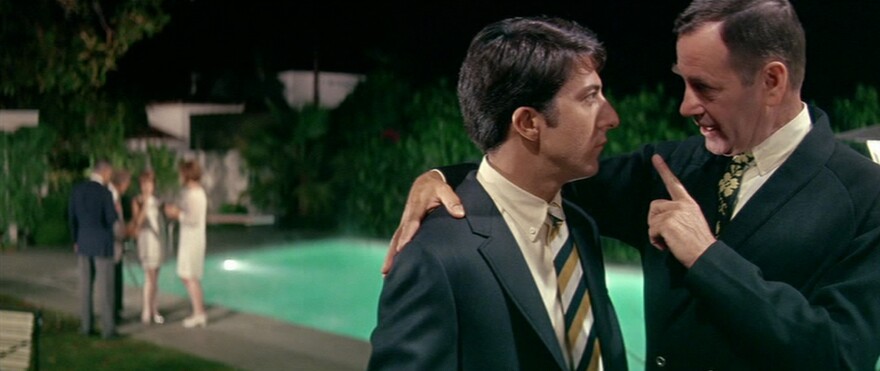Thinking back on "The Graduate," most of us remember its great lines, the embarrassingly funny scenes leading to Benjamin Braddock (Dustin Hoffman) leaping into bed with Mrs. Robinson, and the cathartic climax of the film as Elaine (Katharine Ross) and Ben escape their parents and their pre-destined futures for an uncertain life.
"I want [my future] to be different," Ben tells his father at the beginning of the film. As an eighteen-year-old seeing "The Graduate" for the first time, I could relate to that, and I suspect that's one of the reasons the film has been embraced year after year, now by a third generation with this 40th Anniversary Edition DVD from MGM.
The film's central premise was quite shocking forty years ago and it still has the ability to make you a little twitchy today, if you really think about it. Our hero has an affair with the mother of his future girlfriend. A woman, I might add, who's known him since he was knee high to a grasshopper. As Dustin Hoffman notes on the DVD commentary track that accompanies this new release, director Mike Nichols instructed him to imagine what it might be like to seduce your own mother, and then to let that inform his early scenes with Anne Bancroft, playing Mrs. Robinson. Audiences embraced the oedipal undertones and enjoyed "The Graduate," and the film was nominated for seven Academy Awards.
Despite the film's popular and critical success, Nichols took a few lumps for supposedly not addressing the social upheavals of 1967 in "The Graduate." Race relations, drugs, Vietnam, and long-haired hippies receive little to no mention in the film, save for Norman Fell asking Ben if he's one of those "agitators" late in the film as Ben pursues Elaine to Berkeley. Nichols insisted on sticking to the story (written in 1962) and the characters rather than mucking it up with cultural references. But young people -- and those who remember being young -- identify with Ben because we all want our lives to be different than our parents. In that way, "The Graduate" did address the upheaval of the sixties. It remains relevant today, and probably will forever, so long as kids keep rebelling.
But a funny thing happened to me when I watched "The Graduate" this time. I felt differently about Mrs. Robinson. Instead of seeing her as simply the older woman preying upon young Ben, I recognized the pain Mrs. Robinson must carry with her; cut off from her own dreams at an early age by an unplanned pregnancy that leads to a loveless marriage, alcohol abuse, and life in the suburbs. Her key scene takes place midway through her affair with Ben as he tries to get her to talk to him instead of simply hopping into bed for another roll in the hay. Mrs. Robinson reveals her back story to Ben, including the fact that she majored in art in college, but over the years, she "kind of lost interest" in it. Substitute the word "life" for "art," and I think you'll find Mrs. Robinson to be a lot more sympathetic character than you remember.

Ben, on the other hand, commits to an affair with Mrs. Robinson (though he may be seeking companionship more than sex), stalks Elaine after she flees to Berkeley following the revelation of his affair with her mother, and generally behaves, well, a little immaturely. Not that anyone really does otherwise in the film, but Ben's just not quite the same guy I knew when I was eighteen. Still, he is our hero, and I'm always rooting for him to win Elaine back.
Another thing I took notice of on this recent viewing of "The Graduate" was the way the movie was filmed. It's almost 1960s-style European in its use of shots that call attention to themselves, such as Ben's descent into the family pool, seen through the mask of his diving suit, or the clever editing employed during the Simon & Garfunkel-scored interludes. There are also several extremely long scenes, filmed all in one take. I found new appreciation for the craft that went into "The Graduate," and the extra features on this DVD reveal that the cast rehearsed for a month before shooting began to make sure those scenes worked flawlessly.
The features included on this DVD include some that were ported over from previous editions of the disc (this release marks the film's third release on DVD), such as an entertaining one-on-one conversation with Dustin Hoffman where he recounts the entire audition process. Newly created for this disc are the documentary featurettes "Students of the Graduate" and "The Seduction," totaling about 40 more minutes of insight into the making of this classic. Included are two audio commentaries: one features director Steven Soderbergh quizzing Mike Nichols about his film -- that one is a little dry. The more entertaining of the two tracks features Dustin Hoffman and Katharine Ross chatting about the film. They sound like they're in the same room together on this audio track, and they're clearly having a good time reminiscing about the movie and the shoot. Hoffman tells Ross a couple of times he had a big crush on her.
A limited number of copies of this 40th Anniversary Edition of "The Graduate" come with a CD sampler featuring four of the Simon & Garfunkel tunes heard in the movie, but fans of the film probably already have these songs in their collection.
"The Graduate" is a film that will likely remain on critics' Top 25 lists for a long time to come. New viewers are minted each spring as classes let out at high schools and universities across the nation. And kids will continue to identify with Benjamin, so long as their parents keep telling them there's a great future in plastics.


